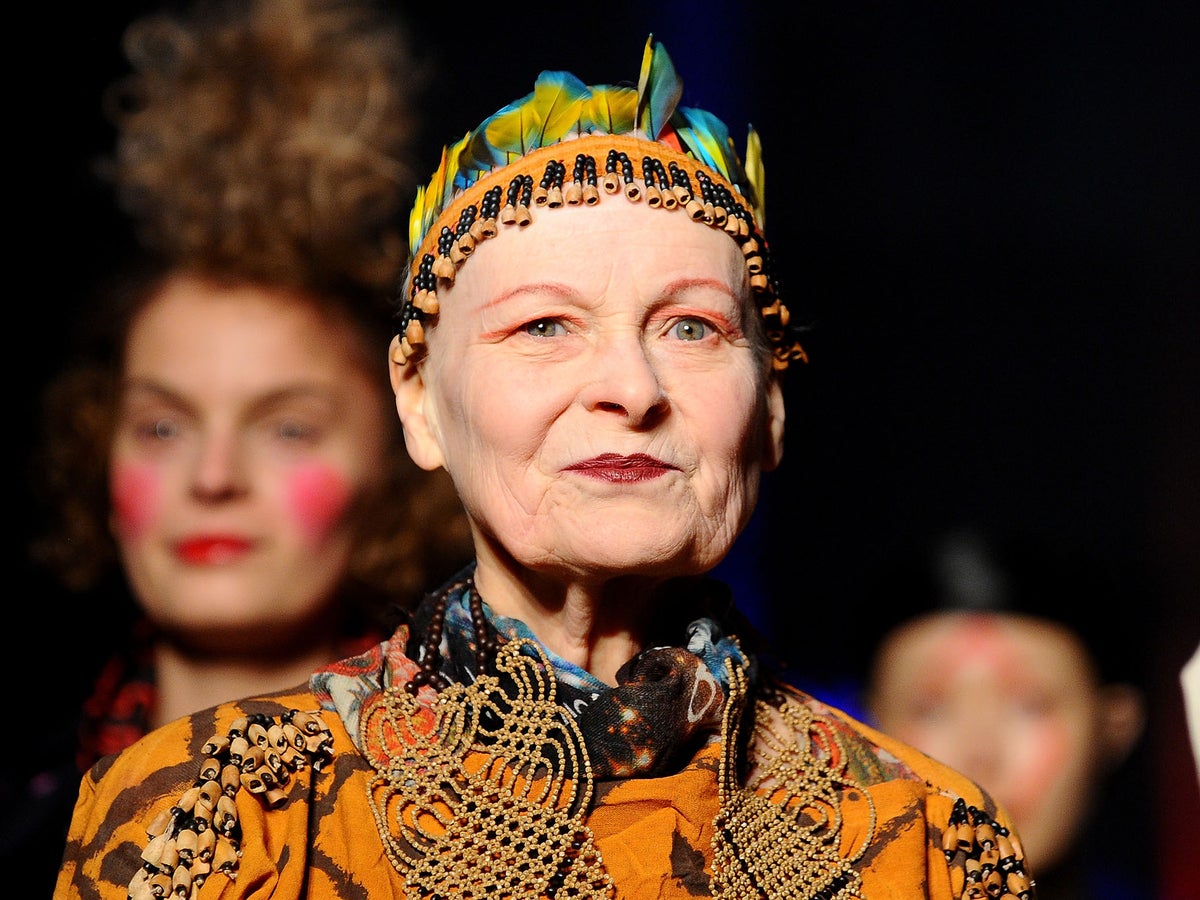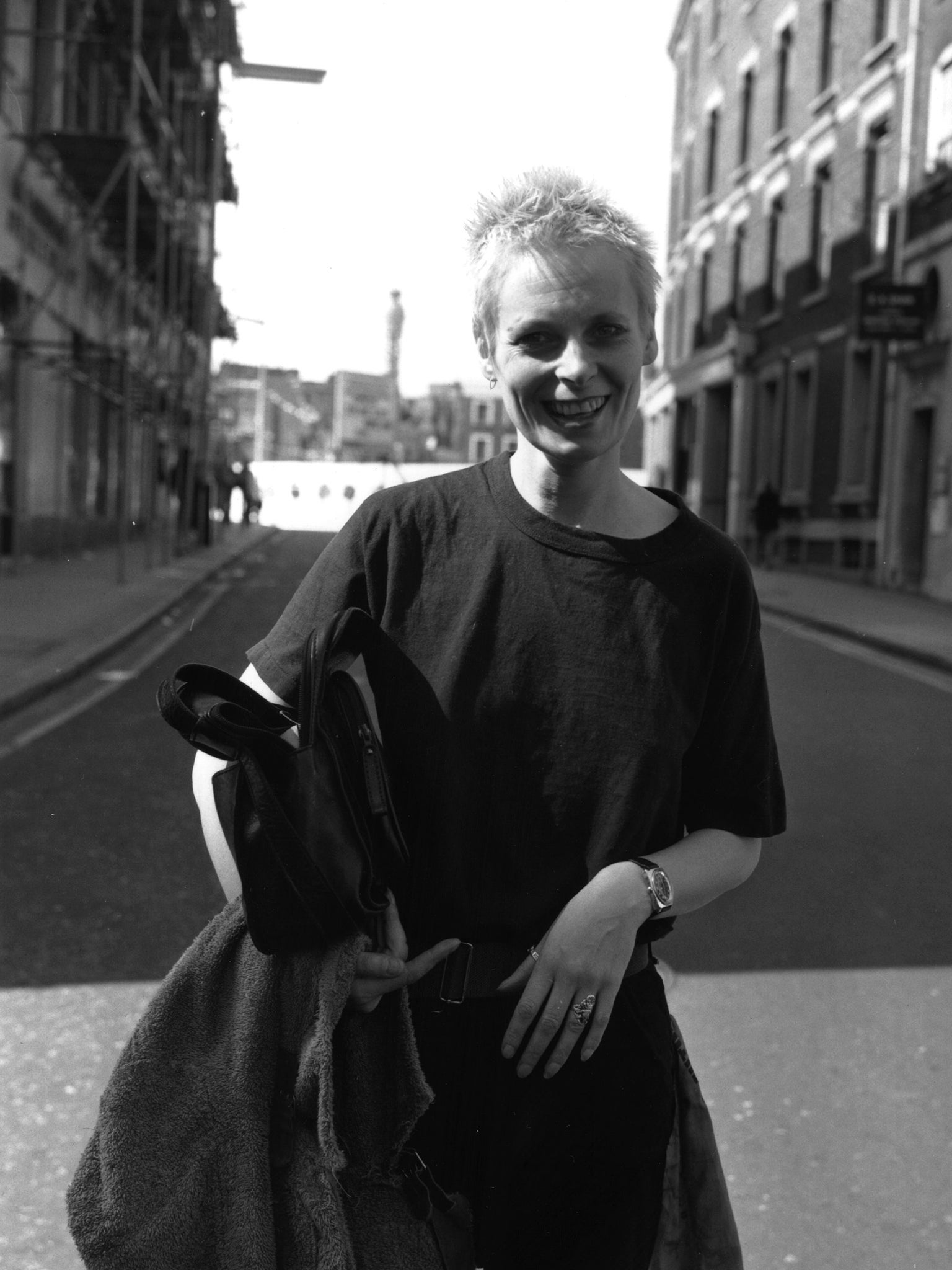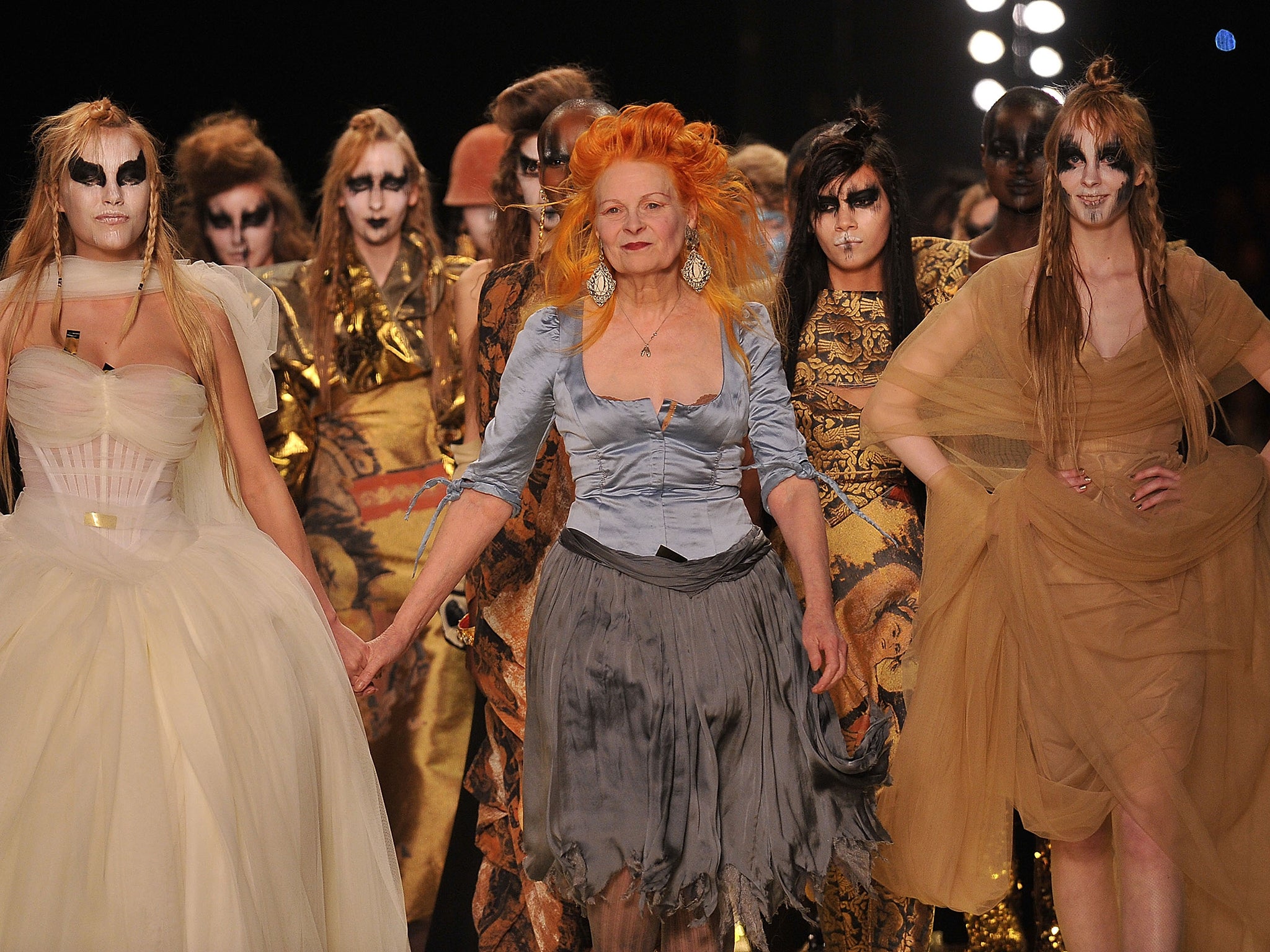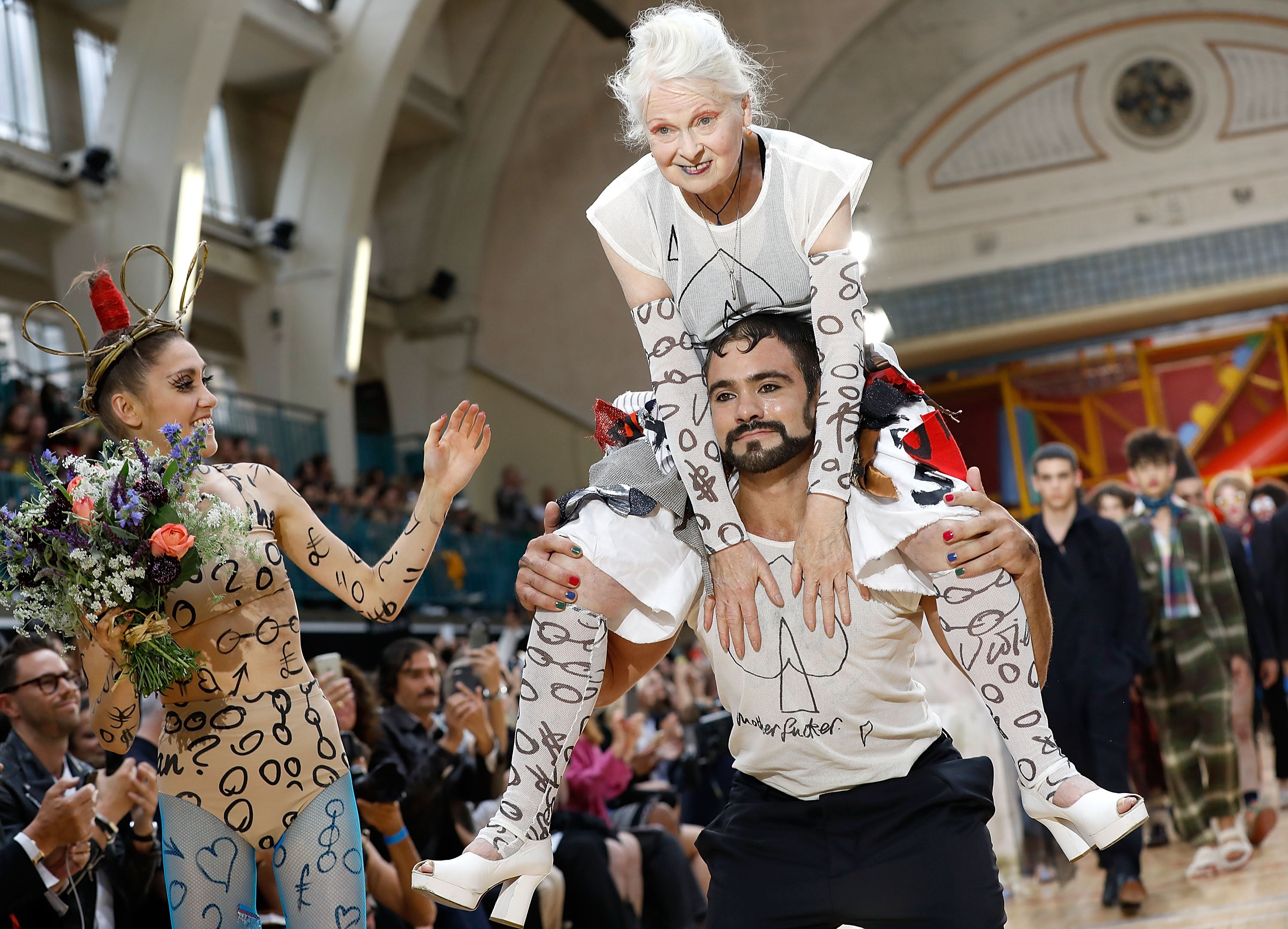
The only designer in the history of fashion to actively discourage the acquiring of clothes, Vivienne Westwood’s mantra – Buy Less, Choose Well, Make it Last – was the complete antithesis to contemporary consumerism. A unique mix of maverick and renegade, aesthete and activist, Westwood was a quietly spoken whirlwind with disarming honesty and unpretentious air.
Westwood, who has died at the age of 81, had a penchant for poetry by TS Eliot, paintings by Boucher and caricatures by Hogarth. One of her favourite books was Alice in Wonderland, another The Grapes of Wrath. Proud of the fact she had been arrested during the punk era for selling pornographic T-shirts, and dragged off a boat by the police during the now infamous 1977 Sex Pistols performance on the Thames, her passions ranged from dressing up to human rights. The Vivienne Westwood signature – an orb surrounded by Saturn – became one of the most iconic symbols in the fashion world.
So respected in China that they bestowed the title “Western Empress Dowager” on her, Westwood’s achievements weren’t merely admirable – they were phenomenal. Awarded an OBE in 1992 and made a dame in 2006 she was the polar opposite of a nepo baby. Westwood was a completely self-made woman whose success was borne out of a relentless work ethic coupled with years of self-education and an intense sense of curiosity. Appearing frequently across social media, she owned neither a television nor mobile phone.
Vivienne Isabel Swire was born on 8 April 1941 in a row of cottages between the villages of Tintwistle and Hollingworth in Glossop, Derbyshire. Blessed with what she described as an idyllic childhood, her Father Gordon was descended from a family of shoemakers. Her mother Dora a cotton weaver. At 17 years old, in 1958, together with her brother Gordon and sister Olga, the family relocated to Harrow in London to run a post office. Three years later Westwood had met and was married to Airline Steward Derek Westwood only to leave after the birth of their son Ben. She described him later as “a good man”.
Westwood met situationist art student Malcolm McLaren – a friend of her brother – when he was sleeping in the back of a car. McLaren pursued Westwood relentlessly. She initially shunned his advances. Eventually they bonded over a mutual desire to overturn the hippy movement and replace it with punk. Angry at the fact that the governments responsible for the Vietnam war were still in power, Westwood and McLaren created a style and attitude associated with anarchy that sent shivers down the spine of the establishment and local governments alike.

A series of retail experiments created by Westwood and McLaren: Let It Rock, Too Fast To Live, Too Young to Die. SEX then Seditionaries ended with the death of Sid Vicious and the demise of the Sex Pistols. Making a mutual decision to focus on fashion collections rather than retail concepts, on the afternoon of Tuesday 31 March 1981 at London’s Olympia, Westwood presented the Pirate collection and became a fully fledged fashion designer.
In 1986, Chris Griff, who later became manager of the Vivienne Westwood Liverpool store, made the journey to Worlds End at 430 Kings Road from St Helens in Merseyside as an 11-year-old schoolboy with his grandmother. “There were candles and ashtrays all around. Vivienne’s mother Dora was sitting at the back. As I left Vivienne said to me: ‘You need to read.’” Despite what are now considered seminal collections – Nostalgia of Mud, Harris Tweed – success came slowly.

By 1989, Westwood, who had frequently appeared in Italian Vogue courtesy of Anna Piaggi was starting to gain international recognition. A major turning point was the endorsement by John Fairchild of Women’s Wear Daily who cited Westwood in his book Chic Savages as one of the six most influential designers in the world. This was the catalyst. After years of being shunned by the British Fashion Council, in 1990 they finally relented at the request of her fellow designers, awarding her Designer of the Year two years running. Her consequent appointment as guest professor of fashion at the Vienna Academy of Applied Art was where she met Andreas Kronthaler who would become her assistant and later her husband, soulmate and constant source of support.
By 2000, Westwood was becoming increasingly political and was no stranger to publicity stunts, often going to extraordinary lengths to prompt economic, environmental and social change. With the help of her son Joe Corre – founder of Agent Provocateur – at the 2012 Paralympics she unfurled a Climate Revolution banner during a live stream broadcast. She rode on a tank through to David Cameron’s house in an anti-fracking protest.

At the 2013 Met Ball entitled Punk: From Chaos to Couture in New York, she sported an A4 picture of US military whistleblower Bradley Manning with the word “TRUTH” in capital letters pinned to her chest. Her most recent exploit was being suspended in a giant birdcage wearing a yellow trouser suit akin to a canary to draw attention to the extradition of WikiLeaks founder Julian Assange. A fearless advocate for global and human rights, she told model Naomi Campbell in a filmed interview for British Vogue “The rotten financial system is the cause of the whole thing. They take money from the poor and give it to the rich. Politicians are criminals. Poverty causes crime. Homelessness is a crime.”
Situated on the top floor of her studio in Battersea Westwood would straddle the worlds of politics and fashion. A typical day would include working intensely in the morning on a knitting pattern and the rest of her time taken up with writing for her website Climate Revolution.
On application forms to study fashion at University throughout the UK Westwood remains a source of constant inspiration. “To the global student community, Vivienne Westwood DBE RDI epitomised the very best of creative British fashion,” said Douglas MacLennan, former head of fashion at Northumbria University, now chair of Graduate Fashion Foundation. “Her absolute rejection of conformity won the admiration of her global contemporaries who placed her alongside the elite creatives, for example Vionnet, Madame Gres, Yves Saint Laurent and Christian Dior.”
Before her death, Westwood, by now a fervent believer in the Tao, had a meeting with Jeff Banks, a 79-year-old designer, businessman and former TV presenter from her hospital bed. When Westwood was on the verge of going bankrupt it was Banks who not only gave invaluable advice but put his hand in his pocket. Plans were put in place for him to be a director. “I felt a bit like Cardinal Wolsey going to see the monarch,” he told The Sunday Times. Westwood wanted to ensure “the company remains at the forefront of climate change, activism and sustainability”.
Of the thousands of tributes to Westwood across social media, including Anna Wintour, Marc Jacobs, Donatella Versace, the most poignant came from her granddaughter Cora Corre on Instagram: “Fearless in the face of adversity. Undaunted by criticism driven by conviction. A belief that with sincerity of application everything is achievable…. My forever Queen, you shaped the world for the better. Larger than life, your legacy will forever live on.”
Vivienne Westwood, fashion designer, born 8 April 1941, died 29 December 2022







